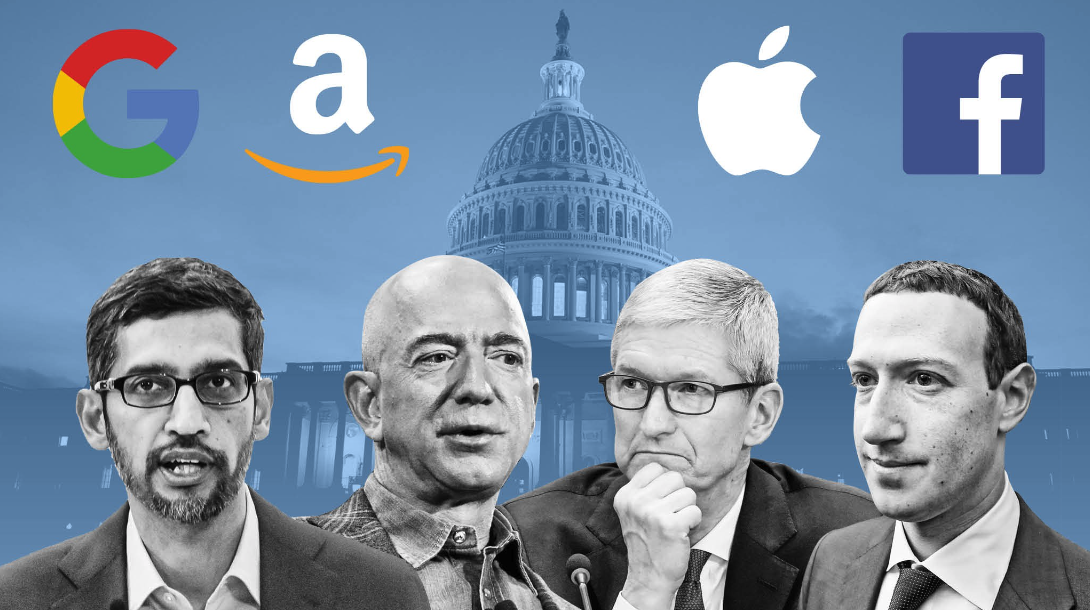By Glynn Wilson —
WASHINGTON, D.C. — Elon Musk of Twitter, Mark Zuckerberg of Meta, the methhead hacker/programmers at Google and YouTube and their lobbyists in Washington, as well as their Republican friends in the House, do not want to hear this. But there is little doubt that more government regulation of social media is coming.
Could 2023 be the year when Congress finds a way?
According to public opinion firms, the year ahead is shaping up to be defined by challenges for major technology companies, and that includes economic pressures rooted in inflation, high interest rates, layoffs and decreased investor and consumer confidence. But chances are, on top of all that, the leaders at Big Tech will also have to grapple with a strong consumer appetite for more government regulation.
Since last August, more people — Democrats, Republicans and independents — say they support greater government regulation of major technology companies than oppose it, according to Morning Consult tracking of consumer attitudes, which shows that there is bipartisan support for more regulation of the sector.
This net support notably rose among Democrats in November following major Democratic wins in the Senate, as well as Elon Musk’s Oct. 27 takeover of Twitter, which had a significant polarizing effect on the brand.
“While regulation of specific industries often happens behind the scenes in silos, popular support for regulation can give legislators and regulatory bodies the added political capital they need to get regulation over the finish line,” Morning Consult analysts say.
This is especially true now given the recent boost to the Senate majority by Democrats, the Biden administration’s position keen on reining in the influence of Big Tech, a Federal Trade Commission that seems ready and willing to act under Chair Lina Khan, and a coming challenge to tech’s immunity on user-generated content before the Supreme Court.
“It seems inevitable that the industry’s operating environment will change very soon,” according to MC.
It is true that consumers tend to hold positive views of the tech industry. But at the same time, many say companies such as Google, which also owns YouTube, and Meta, which owns Facebook, Instagram and WhatsApp, currently have too much power and do not always act in the best interest of the public.
Morning Consults says this it not a “knee-jerk reaction” to the politicization of the industry. While 62 percent of adults surveys in the U.S. hold a favorable impression of major tech companies, including 67 percent of Democrats and 61 percent of Republicans, a clear majority of 54 percent also agree the industry’s best days remain ahead. The desire for regulation is rooted in the idea that major technology companies “have too much power,” analysts have found. Two-thirds of Democrats and Republicans agree with that statement, and agreement is strong even among tech’s most stalwart supporters, those from the Millennial Generation and Gen Z.
Consumers see benefits in limiting the scope of major technology companies, and are more likely than not to agree that breaking up major tech companies into smaller ones would make the market more competitive, be better for small businesses and improve innovation. Many of consumers’ opinions on the consequences of reining in the size of these companies align with the regulatory objectives of legislators and the FTC.
Officially and understandably, major technology companies have responded to the various regulatory proposals they face with doubt over their efficacy in solving the problems they claim to address. Practically speaking, they have already set the gears in motion to abide by them — all while spending millions of dollars on lobbying to fight off government regulation efforts.
Stricter laws and regulations governing data collection and competition in the European Union and Australia show that multinational tech companies have an incentive to set unified rules across their platforms, rather than confusing guidelines by market depending on local laws and regulations. Even before California’s Consumer Privacy Act went into effect, tech was abiding by Europe’s General Data Protection Regulation.
While some leaders in the industry have expressed an interest in seeing a more clear clarification of the rules by governments, they are still fighting government regulations behind the scenes just as Big Oil and Big Tobacco did before them.
Facebook/Google Kill Bill Before Christmas
In case you were not paying attention to the news back during the Christmas/New Years holidays, Senator Amy Klobuchar went on NBC’s “Meet the Press” and claimed that Facebook and Google lobbyists killed several bipartisan bills she had the support to pass, including the Journalism Competition and Preservation Act, which would have allowed news organizations to jointly negotiate fair terms for access to their content by Google, YouTube, Facebook, Twitter and other dominant platforms, much like a law passed in Australia pushed by Fox News owner Rupert Murdoch, who also owns tabloid newspapers in the UK and Australia.
The bill was passed in the Senate and House Judiciary Committees, with the full support of Iowa Republican Senator Chuck Grassley, but never made it to a vote on the Senate floor. But it may not have all been the fault of Facebook and its lobbyists.
According to reporting from Bloomberg News, Politico and other news outlets, Senate Majority Leader Chuck Schumer, whose daughters work for Amazon and Meta, declined to bring the measures up on the floor in the lame duck Congress, claiming a series of bills didn’t have the votes, despite insistence from the bill’s co-sponsors that they did have enough support.
But Senator Klobuchar was adamant on the Sunday morning talk show.
When asked by host Chuck Todd, “How powerful was this tech lobby?”
“So powerful that you literally can have a bill that got through the Judiciary Committee with strong bipartisan support, you can get promises from leaders that it’s going to be a major end-of-year bill and then within 24 hours, it’s gone,” she said. “It’s vanished. Because of one company, two companies in this case; Facebook and Google”
By the way, she said, Google made $66 billion in one quarter in advertising “while we are going to lose one third of the nation’s newspapers by 2025,” she said. “We had such strong support for this bill, but these guys just make a few calls and they just say, ‘Hey. You know, this is going to hurt us just like they did in Australia.'”
“The difference was in Australia, their government stood up and said, ‘No. We’re going to do this and we’re going to say, ‘You’ve got to negotiate with these news organizations to get fair price for their content.’ And it happened. And they have a better system in place.”
“Right now in the United States of America, these companies have basically started dominating our thought processes. … It is about going after these algorithms … for … transparency. That’s one of the bills we have. And it is about getting compensation for our news organizations. And then finally, it’s about getting rid of archaic law, Section 230, that gives them immunity from lawsuits.”
Key Republican House leaders made it clear the legislation will not come up when they retake control of the lower chamber in January, since any legislation they might push would take aim at blaming social media companies for targeting the so-called “free speech” of conservatives.
“Big tech companies have spent hundreds of millions of dollars in a brazen attempt to thwart any progress on tech policy in Washington,†Klobuchar spokeswoman Jane Meyer has said, adding that Klobuchar and the bill’s House and Senate co-sponsors “did not back down” despite an onslaught of recommended amendments.
“The big tech companies put aside rivalries and joined forces,” Bloomberg reports. “They and their trade groups spent more than $100 million on lobbying in two years, outpacing high-spending industries such as pharmaceuticals and defense. They donated more than $5 million to politicians, and tech lobbyists bundled more than $1 million to the PAC in charge of defending the Democrats’ majority. And they put millions more into dark-money groups, nonprofits and trade associations that aren’t required to disclose the source of their funding. Several congressional aides said they received more outreach on the bills than any other they’d worked on in years.”
The companies poured $130 million into advertising campaigns, primarily targeting swing states such as Georgia, New Hampshire and Arizona, according to ad analytics service AdImpact. Many of the ads implied that Democrats could lose the Senate and Republicans could miss their chance at a legislative majority if they supported the legislation.
The campaign argued the bills would destroy Google Search and Amazon Prime and disrupt the global economy. Amazon and tech-funded nonprofit Connected Commerce brought dozens of small business owners to Washington to argue that they would suffer. Google tapped former national security officials on its payroll to say the bills could harm national security. Apple poured money into a free-market group, Taxpayers Protection Alliance, to launch the “App Security Project,†which argued that the bills would make phones vulnerable to hacking and spying.
The companies’ top executives worked the halls. Apple Chief Executive Officer Tim Cook and Google CEO Sundar Pichai met with members of the Senate Judiciary Committee, including Delaware Democrat Chris Coons, a close ally of President Joe Biden.
“There has been very forceful lobbying against this legislation,” Coons said in an interview. “Every one of us has seen dozens and dozens of TV ads, emails, social media posts.”
Biden Administration Plan for Big Tech
President Biden recently issued a rare call to action for Congress to “unite†on legislation to “hold Big Tech accountable,†offering his most detailed road map to date for what legislation he believes lawmakers should advance to rein in Silicon Valley giants.
“It’s time to walk the walk and get something done,†Biden wrote in a Wall Street Journal op-ed, outlining several areas for potential bipartisan action, according to reporting by The Washington Post.
Biden wants privacy protections for all consumers, especially children. Congress should set “clear limits on how companies can collect, use and share highly personal data†with “even stronger†protections for “young people,†including by limiting targeted advertising for all consumers and banning it for children, Biden said.
House lawmakers last year advanced a bipartisan measure that would largely bar companies from collecting data that’s not necessary to provide specific services, give users a right to opt out of targeted advertising and ban such ads for minors. Senate Democratic leaders have introduced legislation that would similarly minimize how much data companies collect and advanced a separate bipartisan bill to ban targeted ads to kids.
Leaders in both chambers would like to pass both broader privacy guardrails and tougher standards for children, but they can’t agree on what to prioritize. House leaders say their legislation accomplishes both, while Senate Democratic leaders say that it’s not strong enough, and that disagreements over a broader bill shouldn’t delay updating children’s privacy laws.
Biden is calling for revamping tech’s liability shield.
The tech giants need to “take responsibility for the content they spread and the algorithms they use,†he said, so Congress should “fundamentally reform Section 230 of the Communications Decency Act,†the law that shields digital services from lawsuits for hosting and moderating user content.
Lawmakers have introduced dozens of bills seeking to pare back Section 230 protections. Both House Democratic leaders and Senate Republicans have introduced bills seeking to revoke the protections when platforms algorithmically amplify content, but the former targets instances when it leads to harm while the latter seeks to address allegations of “censorship.†Lawmakers on both sides of the aisle proposed narrower bills dealing with specific types of content, including illegal drugs, counterfeits and child abuse material.
While there’s widespread concern on Capitol Hill that Section 230 has shielded tech companies, particularly large online platforms, from accountability, consensus on a path forward is more limited. Democrats and Republicans have banded together on proposals targeting certain content, particularly around harms to children, but neither of the committees with primary jurisdiction have advanced any bills in recent years. Partisan disagreements over whether platforms moderate too much or too little political content have also bogged down talks.
Biden calls for transparency in the algorithms used.
“We also need far more transparency about the algorithms Big Tech is using to stop them from discriminating, keeping opportunities away from equally qualified women and minorities, or pushing content to children that threatens their mental health and safety,†he has said.
The data privacy bill advanced by House lawmakers includes provisions requiring companies to vet whether their algorithms could cause harm or lead to discrimination, and to disclose those assessments to regulators. Senate lawmakers are separately pushing for legislation that could force companies to cough up more data about their algorithms to external researchers and regulators, a concept endorsed by former president Barack Obama. A children’s online safety bill would also allow for more research into how algorithms impact kids.
There’s bipartisan agreement on the need for greater transparency around how companies deploy their algorithms, but congressional leaders to date have shown little appetite for passing stand-alone bills on those issues. Their fate may rest on how successful proponents are in either tucking their proposals into must-pass legislation, like the annual spending bills, or in reaching agreement on a broader tech package.
Biden wants to boost online competition.
While he did not explicitly cite any proposals, Biden took aim at when large tech companies “find ways to promote their own products while excluding or disadvantaging competitors — or charge competitors a fortune to sell on their platform.â€
A bipartisan group of lawmakers advanced proposals last Congress to bar companies from boosting their products over those of their competitors, a practice known as self-preferencing, as well as legislation to limit app store restrictions on developers.
While lawmakers succeeded in passing legislation to boost funding for federal antitrust enforcers on key Congressional committees, none of their big-ticket tech proposals setting limits on self-preferencing practices got a vote in either chamber. House Republican leaders, particularly Republican Speaker Kevin McCarthy of California and Republican Congressman Jim Jordan of Ohio, have sharply criticized the bills, and some of its proponents have cast doubt on their prospects in this Congress.
But there is no doubt that government regulation is coming for Big Tech. It’s just a matter of when, not if, and what form it will take.
___
If you support truth in reporting with no paywall, and fearless writing with no popup ads or sponsored content, consider making a contribution today with GoFundMe or Patreon or PayPal.














